National Health Care Supply Chain Week: Celebrating 10 Inspirational Leaders
In honor of the Association for Healthcare Resource & Materials Management’s (AHRMM) annual National Health Care Supply Chain Week (October 3-9, 2021), we are proud to recognize several healthcare supply chain professionals who exemplify an exceptional commitment to collaboration, improving patient care and innovation.
This past year has tested the resiliency of our national and global supply chain – from the COVID-19 pandemic to staffing shortages, healthcare supply chain professionals have continuously stepped up to serve their communities and fill the hands that heal. Learn more about their stories below.

Greg Beach
Chief Procurement Officer
Seattle Children’s Hospital
Why did you choose to pursue a role in healthcare supply chain?
My background is Biomedical Engineering with 20+ years of Lean transformation so the transition to supply chain is an interesting journey. In 2000, Seattle Children’s started our Lean journey in healthcare and several of the beginning Lean transformation workshops began in the Supply Chain, Lab and Pharmacy. I was fortunate to be one of the earlier adopters of the Lean Methodology (or Toyota Production System). Through my training and partnership with my Vice President, we determined that the supply chain was the number two expense in the organization behind labor expense, but the supply chain was also one of the number one neglected area in hospitals across the United States -- including Seattle Children’s. I was asked to lead the transformational journey of our supply chain by using the Toyota production system of mapping processes and creating standard work while creating an integrated supply chain via strong partnerships with our clinical teams.
What is your favorite part of your job?
My favorite part of my job is working with my team of leaders and frontline staff who take great pride in the services we provide to our clinical partners who rely on our team to provide world-class services and care to pediatric patients. We have an integrated supply chain that works closely with our clinical teams to constantly look for better ways to provide care to our patients and families.
What’s one thing you’re most proud of this past year? (Professional accomplishment)
The Supply Chain team was nominated and received the Seattle Children’s Dr. David Fisher patient safety award. The team stood out above many wonderful teams in a year that was greatly impacted by COVID-19. The [Supply Chain] team had strong processes and disaster management solutions that helped the organization weather increased supply demand while managing hundreds of back-orders and product substitutions related to the impact on the world supply chain. This work was supported by excellent leaders and frontline staff who followed standard work and daily management systems to help mitigated daily supply chain impacts.
What’s one thing you wish people knew about your role/healthcare supply chain in general?
The success of the Chief Procurement Officer and healthcare supply chain can be gauged by the partnerships the Supply Chain team establishes with our clinical teams. The supply chain is the vehicle in which the products are delivered to the hands that heal. What we deliver is determined by our clinical teams and it is this partnership between the Supply Chain and clinicians that enables extraordinary outcomes to our patients.

Amanda Chawla
MHA, FACHE, CMRP, Chief Supply Chain Officer
Stanford Health Care, Lucile Packard Children’s Hospital & Stanford-Valley Care
Why did you choose to pursue a role in healthcare supply chain?
I began to heavily pursue a career in the healthcare industry at a relatively young age as I wanted to make a difference in people’s lives. While working in healthcare, I fell into supply chain through an opportunity to lead distribution and logistics. I learned first-hand the complexity of our behind-the-scenes work and the value we provide. Supply Chain is the lifeline and blood of the organization; it touches every aspect and directly supports the healing hands that care for patients. I have the opportunity to provide strategic and operational leadership touching nearly every department across the organization, making a difference. We support the financial health and viability of an organization and the care of patients.
What is your favorite part of your job?
Working with the people I have the privilege to work with and learning from my colleagues across Stanford Medicine, our suppliers and partners across the country. Relationships, communication and change management are all core aspects of my job that I enjoy. While the healthcare supply chain pace is demanding and the work is constantly evolving and changing, I love the ability to design and evolve the future of the Supply Chain.
What’s one thing you’re most proud of this past year? (Professional accomplishment)
I am most proud of how our Stanford Supply Chain leaders and staff have responded during this time, thriving despite adversity. Our teams have received numerous recognitions, from the Heartbeat of Healthcare award by the Federation of American Hospitals to a number of our leaders being recognized as future leaders by the Journal of Healthcare Contracting, to being recognized as a leading-edge best practice in our approach to Supply Resiliency/Reliability by Gartner. The list goes on, but I am most proud of how our team has leaned in and responded, changing how we operate.
What’s one thing you wish people knew about your role/healthcare supply chain in general?
To recognize that we are in the people business at the core of what we do and how we operate.
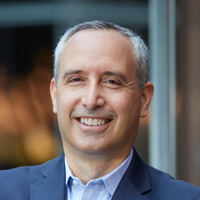
Motz Feinberg
Vice President Supply Chain
Cedars-Sinai Health System
Why did you choose to pursue a role in healthcare supply chain?
I started my career in the engineering and manufacturing field and was at a point in my journey where I wanted to make a greater impact on people’s lives. Having experienced health issues myself, there was no better way to contribute to the health of our communities than joining the industry and serving our patients and clinicians.
What is your favorite part of your job?
My greatest reward is rounding in the hospitals, connecting with front line staff and our patients and seeing how the equipment and supplies our team helped deliver are making a difference in their lives.
What’s one thing you’re most proud of this past year? (Professional accomplishment)
Our industry, profession and the organization I lead have seen tremendous transformational change this past year. The collaboration and passion our teams have demonstrated to not only ensure the health and safety of our frontline staff but to also drive process and technology change has been phenomenal.
What’s one thing you wish people knew about your role/healthcare supply chain in general?
I have had the privilege of working in multiple industries, and healthcare is by far the most complex. The opportunities to evolve and improve the global supply chains supporting healthcare are endless. For those who have the passion for our patients, the patience for transformation and resilience to weather the inevitable bumps – it is a fantastic place to be!
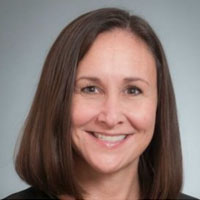
Jennifer Garvin
Vice President of Supply Chain
Christiana Care
Why did you choose to pursue a role in healthcare supply chain?
In my first professional job, I started in the integrated delivery system sector and became exposed to the health care supply chain, a field in which I instantly fell in love. The opportunity to take an integral role in delivering vital supplies and services to our caregivers is a deeply rewarding experience.
What is your favorite part of your job?
One of the favorite parts of my job is the ability to help build and shape the health care supply chain of the future, a system that will be more efficient, effective and will ultimately improve the care of the communities we are privileged to serve. At ChristianaCare, we consider all our employees – including those who work in supply chain – as caregivers, so I would say that another favorite part of my job is the ability to mentor our exceptional caregivers so they can grow into innovative and strategic thinkers and become even better caregivers tomorrow than they are today.
What’s one thing you’re most proud of this past year? (Professional accomplishment)
During this pandemic, one of the things I am most proud of is how my entire supply chain team was able to collaborate and anticipate the needs of our patients and our caregivers. In the face of never-ending hurdles, they continue to ensure that the links in the supply chain remain fortified. And they help our colleagues at ChristianaCare with compassion and generosity.
What’s one thing you wish people knew about your role/healthcare supply chain in general?
While it sounds a little corny, I truly believe I was meant to lead supply chain at ChristianaCare. I am fully committed to help our department become a supply chain that is the touchstone of the industry.
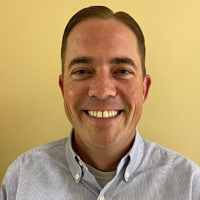
Luke Martin
Administrative Director of Supply Chain Management
Shannon Health System
Why did you choose to pursue a role in healthcare supply chain?
I chose to pursue a career in healthcare supply chain due to the logistics class that I took during my college career. I knew it was something that I needed to explore further, and I had no idea that I would have the opportunity to do what I love daily.
What is your favorite part of your job?
My favorite part of my job is being part of a great team of healthcare professionals who assist with providing exceptional healthcare to our family, friends and neighbors.
What’s one thing you’re most proud of this past year? (Professional accomplishment)
I am most proud of the way our Supply Chain team has responded to the global supply chain crisis, as well as staffing shortages. I am also proud that we accomplished a long-term goal of expanding our distribution center at Shannon, which will allow us to expand our footprint across our organization. I am so honored and humbled to work alongside some really great folks.
What’s one thing you wish people knew about your role/healthcare supply chain in general?
Healthcare supply chain is so much more than pushing boxes. We touch every aspect of our organization, and there is a great deal of moving parts. Patient care is a number one priority, and our team works extremely hard to provide a high level of service to our internal customers and organization.
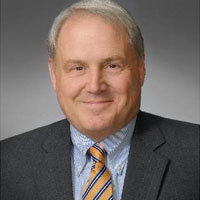
D.H. Peck
Vice President of Supply Chain Management
Houston Methodist
Why did you choose to pursue a role in healthcare supply chain?
Before retiring from the Navy, I was the Senior Enlisted Leader for the U.S. Naval Hospital at Guantanamo Bay responsible for the healthcare of all military personnel, their dependents, and 600 detainees. When rejoining civilian life, I knew I wanted to stay in healthcare in a support capacity.
What is your favorite part of your job?
It’s about helping the patients in supporting the clinicians and caregivers by filling the hands that heal. I like challenges and under normal circumstances, no two days are alike. Over the past 18 months, sometimes things changed hour by hour.
What’s one thing you’re most proud of this past year? (Professional accomplishment)
Leading a team of experienced professionals that ensured our frontline workers never ran out of PPE or supplies, no matter what the “shortage du jour” may have been. This team broke barriers, built new relationships, partnered with non-traditional sources, even anticipated shortages, to keep the supply chain flowing.
What’s one thing you wish people knew about your role/healthcare supply chain in general?
ISupply Chain is far from the “buy the product, get it delivered” transactional operation people might see it as. A successful healthcare supply chain takes end to end logistics through strategy, clinical and operational alignment and optimizing quality and cost.
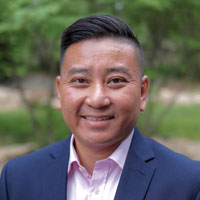
Binh Pham
Executive Director Supply Chain Operations
Hoag Memorial Hospital Presbyterian
Why did you choose to pursue a role in healthcare supply chain?
I love the flexibility that supply chain has and all the opportunities that supply chain offers. Supply chain allows me to fulfill my passion with innovation, technology, and process improvements. Supply chain has so many different paths that you can take. Supply chain can take you to all different places across the US and the world. Through those travels supply chain gives you the opportunity to meet amazing people along the way. Supply chain also gives you the opportunity to stay close to home to serve your community and other communities. I like that there is never a dull moment and every day is different from the next.
What is your favorite part of your job?
Supply Chain is one of the only departments that touches every department at all sites and campuses. So, my favorite part of my job is being able to collaborate, connect, and serve our staff and leaders throughout our entire health system on a daily basis.
What’s one thing you’re most proud of this past year? (Professional accomplishment)
Keeping our staff, patients, and community consistently safe with high quality PPE and supplies by successfully navigating through all global supply chain challenges and disruptions due to the pandemic.
What’s one thing you wish people knew about your role/healthcare supply chain in general?
“The supply chain stuff is really tricky” -Elon Musk
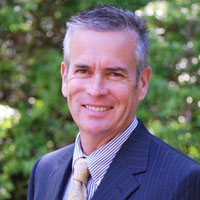
Dan Salmonsen
System Director, Strategic Sourcing and Value Analysis Supply Chain
UW Medicine
Why did you choose to pursue a role in healthcare supply chain?
I started in Home Health at a Children’s Hospital, delivering medical supplies, and I really connected with the role of providing a needed service. I enjoyed creating metrics and driving efficiencies so much that the delivery tracking boards I created got noticed, and I was asked to lead logistics. My role expanded into purchasing and contracting, where I enjoyed building relationships with clinicians and suppliers. As our hospital operations expanded, we recognized the need for a true strategic sourcing operation, and I learned process improvement methods such as LEAN, following the Toyota Production System. Until that point, we had been using GHX, but I discovered that we weren’t optimizing the functionality. After attending the GHX Conference, and over the course of about a year, we moved from a ranking in the top 50th to one of the top hospitals in the nation on key GHX metrics.
What is your favorite part of your job?
It’s rewarding to play a role in ensuring physicians and clinicians have the supplies they need, in the most cost-efficient way.
What’s one thing you’re most proud of this past year? (Professional accomplishment)
Definitely has to be supply continuity. It was an unpreceded time for all of us in supply chain. Having to get creative, working across many vendors, relying on relationships and working as a team to provide supplies to treat COVID patients. UW Medicine never ran out of supplies, and we used many different products and manufacturers to meet our needs. One way we accomplished this was by establishing an allocation committee with representation across the health system, including supply chain, a physician champion and infection control. We met daily to secure and distribute supplies based on clinical need. So many people contributed to this: from our clinicians, receiving dock staff to buyers, informatics, value analysis and inventory control.
What’s one thing you wish people knew about your role/healthcare supply chain in general?
It’s complex. Ordering products and ensuring they reach the bedside for care sounds simple, but there are so many people and processes that contribute to that. Supply chain leaders develop critical relationships, both internally with supporting departments and clinical service lines, and externally, with our GPO, distribution partners, suppliers and technology providers. Another big component of our success is the value analysis process to ensure the right products are contracted, ordered and delivered. The past year showed how important our clinically-integrated supply chain was to our supply continuity.
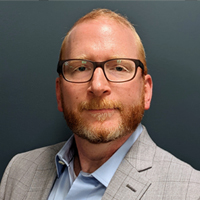
Jesse Stanton
CMRP, Director, Supply Chain Integration
Parkview Health
Why did you choose to pursue a role in healthcare supply chain?
The main reason that I have chosen to pursue a role in supply chain is the ability to affect patient care on so many levels. Whether it is the purchase of facial tissue to console patient and families to biologic tissues critical in performing wound care skin gaffs, Supply chain is intimately involved in the delivery of patient care.
What is your favorite part of your job?
My favorite part of the job is the shifting dynamics of supply chain operations. From day to day, I can be working on a value analysis project or running an RFP for purchased services. Being adaptable and flexible in my function is exciting, challenging and rewarding all at the same time.
What’s one thing you’re most proud of this past year? (Professional accomplishment)
Over the last year I obtained my credentials as a Certified Materials Resource Professional (CMRP). The continued journey through COVID has solidified my understanding of what it takes to be a CMRP.
What’s one thing you wish people knew about your role/healthcare supply chain in general?
That there is more to supply chain than purchasing supplies. We act as gatekeepers to ensure that all purchases are vetted appropriately to protect patients. We are subject matter experts in value analysis, procurement, contracting and vendor management.
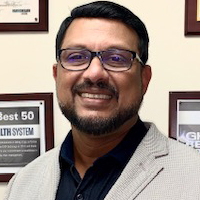
Jacob Titus
Operations Manager, Systems and Analysis
Harris Health System
Why did you choose to pursue a role in healthcare supply chain?
Since I work for a safety net healthcare system, it’s a way to serve the community. Supply chain is the lifeline of the healthcare industry; it ensures that medical equipment, supplies and medications reach the patients and patient care area smoothly. Every dollar we save will be efficiently used to provide high quality care and services to our patients.
What is your favorite part of your job?
I am a big fan of supply chain process automation. Automation technology is one of the most dramatic ways in which supply chain management can affect the healthcare industry by establishing smarter and leaner processes. Harris Health System has automated 89% of its PO lines with the help of advanced technologies like Pyxis inventory system, PeopleSoft ERP system and GHX tools.
What’s one thing you’re most proud of this past year? (Professional accomplishment)
During the past year, the whole healthcare industry was dealing with the pandemic and finding PPE supplies to meet the increased demand. Our strategic sourcing plan and forward thinking facilitated our ability to keep enough inventory to meet the increased demand for supplies and PPE. We leased three warehouse locations where we kept a 3-month stock of PPE and other supplies to meet the increased demand. Strategic sourcing helped us to source and store the supplies at the lowest possible price and keep the supply costs within budget.
What’s one thing you wish people knew about your role/healthcare supply chain in general?
I am a strategic leader in Supply Chain Management Systems, Distribution and Logistics delivering recognized results for 29 years. I have a strong change management background and have been instrumental in developing and implementing several strategic initiatives involving service line development, expansion of services, cost containment and operational efficiency over the course of my career.